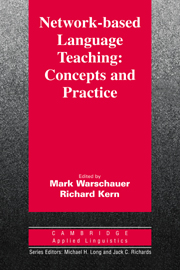Book contents
- Frontmatter
- Contents
- List of contributors
- Series editors' preface
- Preface
- 1 Introduction: Theory and practice of network-based language teaching
- 2 Sociocollaborative language learning in Bulgaria
- 3 On-line learning in second language classrooms: An ethnographic study
- 4 Negotiation in cyberspace: The role of chatting in the development of grammatical competence
- 5 Writing into change: Style shifting in asynchronous electronic discourse
- 6 Computers and collaborative writing in the foreign language curriculum
- 7 Networked multimedia environments for second language acquisition
- 8 An electronic literacy approach to network-based language teaching
- 9 Task-based language learning via audiovisual networks: The LEVERAGE project
- 10 Is networked-based learning CALL?
- Name index
- Subject index
2 - Sociocollaborative language learning in Bulgaria
Published online by Cambridge University Press: 05 October 2012
- Frontmatter
- Contents
- List of contributors
- Series editors' preface
- Preface
- 1 Introduction: Theory and practice of network-based language teaching
- 2 Sociocollaborative language learning in Bulgaria
- 3 On-line learning in second language classrooms: An ethnographic study
- 4 Negotiation in cyberspace: The role of chatting in the development of grammatical competence
- 5 Writing into change: Style shifting in asynchronous electronic discourse
- 6 Computers and collaborative writing in the foreign language curriculum
- 7 Networked multimedia environments for second language acquisition
- 8 An electronic literacy approach to network-based language teaching
- 9 Task-based language learning via audiovisual networks: The LEVERAGE project
- 10 Is networked-based learning CALL?
- Name index
- Subject index
Summary
New technologies and access to them have brought a whirlwind increase in the number of available designs for learning. Such development has brought to the education sector innumerable possibilities for rethinking language and literacy and, in turn, redesigning instruction (New London Group, 1996). Consideration of potential redesigns, however, must be guided by two interdependent considerations: first, current, best instructional theory and practice; second, careful consideration of the situational variables that pertain to contexts of technology use. This chapter discusses the redesign of an English as a foreign language (EFL) curriculum at the University of Sofia, Bulgaria. Central to the rethinking and redevelopment of the resulting technologies-based curriculum was careful consideration of (1) current best language teaching practice; and (2) technologies that could be called into service of such activity.
Background
The development and implementation processes of the literatureand technologies-based curriculum in Bulgaria enjoyed an opportunity unique to former Communist-bloc countries; that is, because of imposed isolation of the academic community up until democratization in 1989, foreign language instructional practices were not influenced by the major rethinking and restructuring experienced by the international language teaching community from the 1960s to the 1980s. Consequently, up to the time of Bulgaria's reopened communications with the rest of the world, EFL curricula followed fairly closely the traditional British model, one that emphasized the study of philology, literary canon, and language appreciation.
- Type
- Chapter
- Information
- Network-Based Language Teaching: Concepts and PracticeConcepts and Practice, pp. 20 - 40Publisher: Cambridge University PressPrint publication year: 2000
- 8
- Cited by



